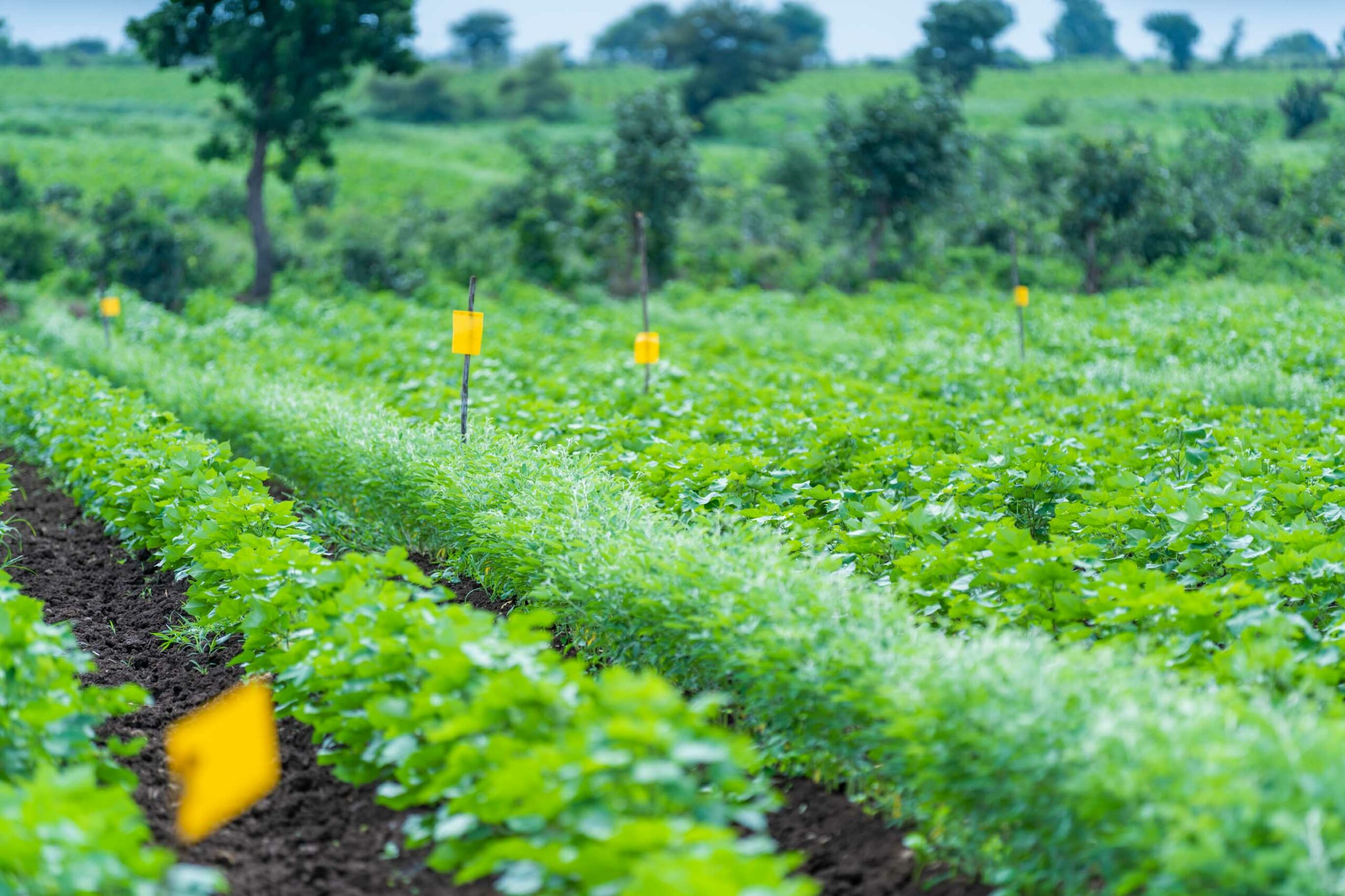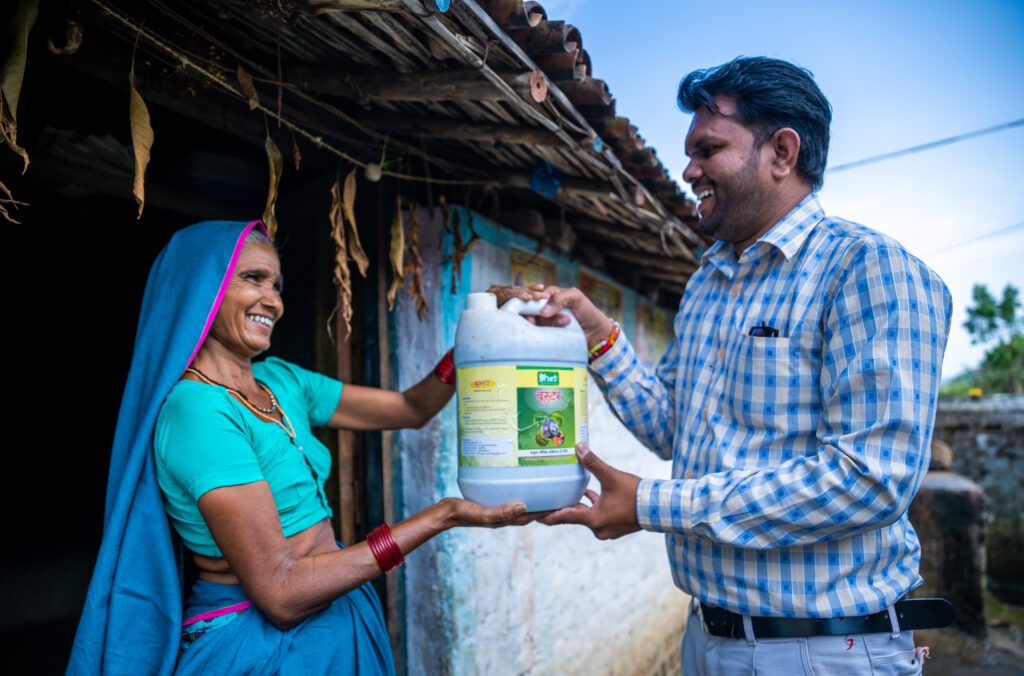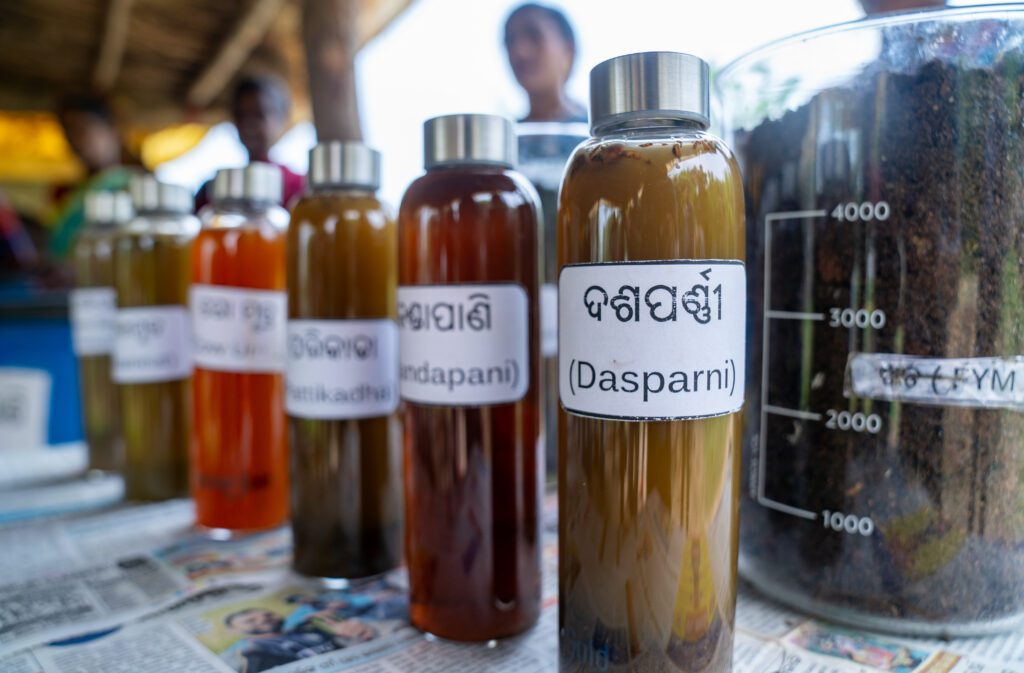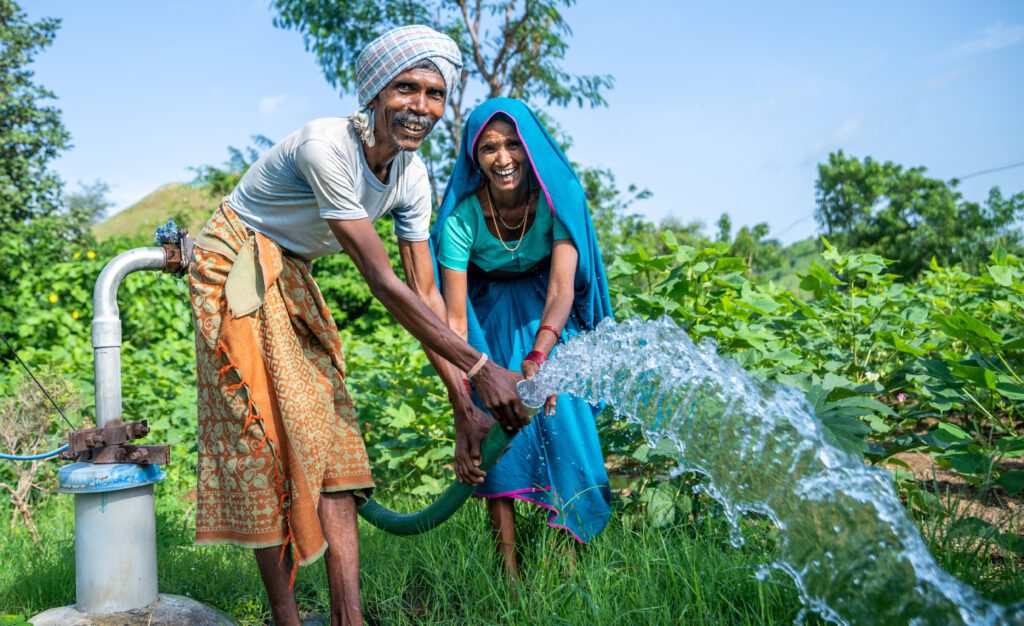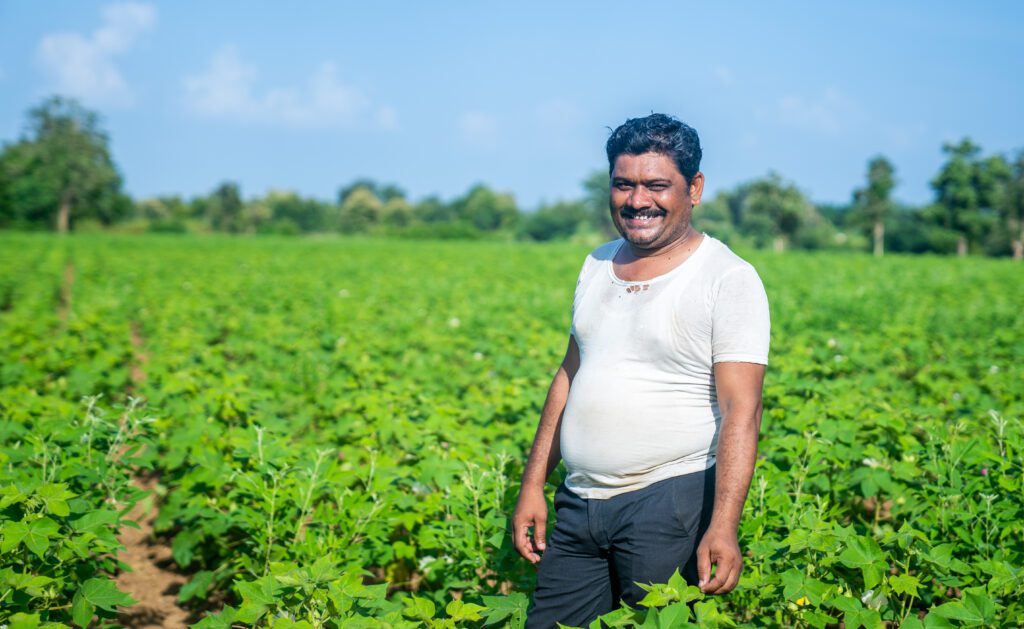Awali is a small village in Madhya Pradesh state in central India. It is surrounded by expansive cotton fields reaching as far as the eye can see, with rows upon rows of cotton plants swaying in the warm wind. It is in this idyllic setting that we met cotton farmer Kerli Esteriya.
Kerli is an ‘organic in-conversion’ farmer. For years, Kerli and her family relied on conventional cotton farming practices, including heavy use of chemical pesticides and synthetic fertilisers, which led not only to high costs but to severe soil degradation and some health consequences too. With the help of the Organic Cotton Accelerator (OCA) and local partners, she decided to shift to organic practices two years ago. The transition has not been an easy one, and like many other smallholders, Kerli required support to persevere through the challenges of the first years following her switch to organic cotton.
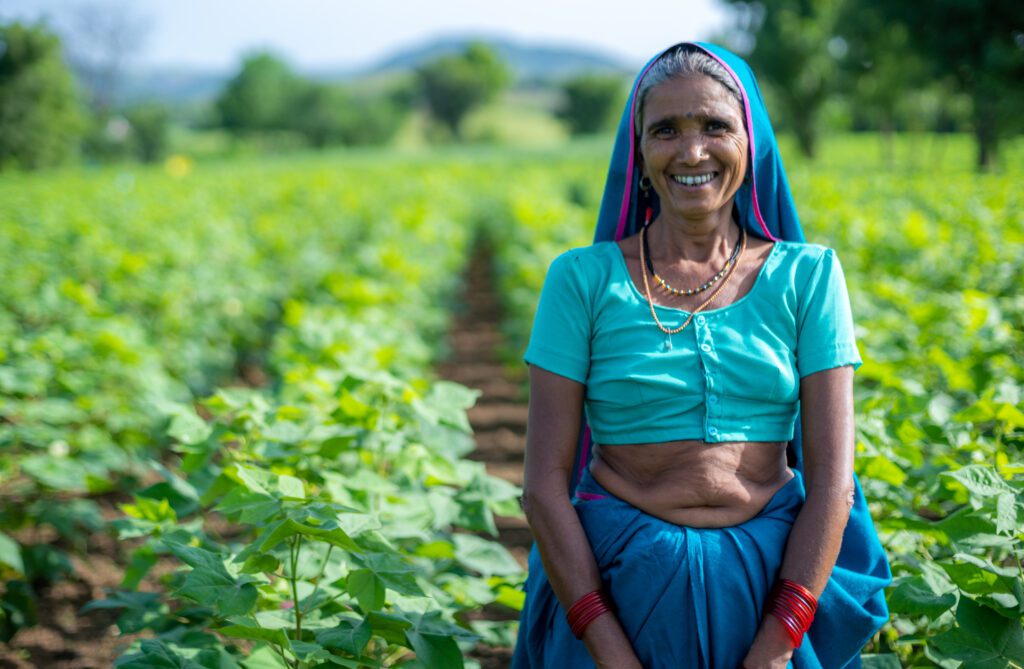
What is organic in-conversion cotton?
Not entirely conventional, not yet certified organic, so what is it?
Organic in-conversion cotton is the raw material produced during a three-year journey undertaken by conventional farmers to become fully organic. It is also known as ‘cotton in-conversion’, ‘in-conversion cotton fibre’, ‘transitional cotton’, or ‘in-transition cotton’. During this period, farmers adopt organic farming practices, such as avoiding synthetic pesticides and genetically modified seeds.
Is organic certification guaranteed?
Completing the ‘in-conversion’ program isn’t an immediate ticket to organic certification. The certification process requires evaluation and verification by accredited bodies. Nonetheless, by committing to organic practices during the organic in-conversion phase, farmers have a high chance of achieving full organic certification. To effectively align their practices with certification requirements, farmers may need expert guidance or to engage in peer-learning communities.
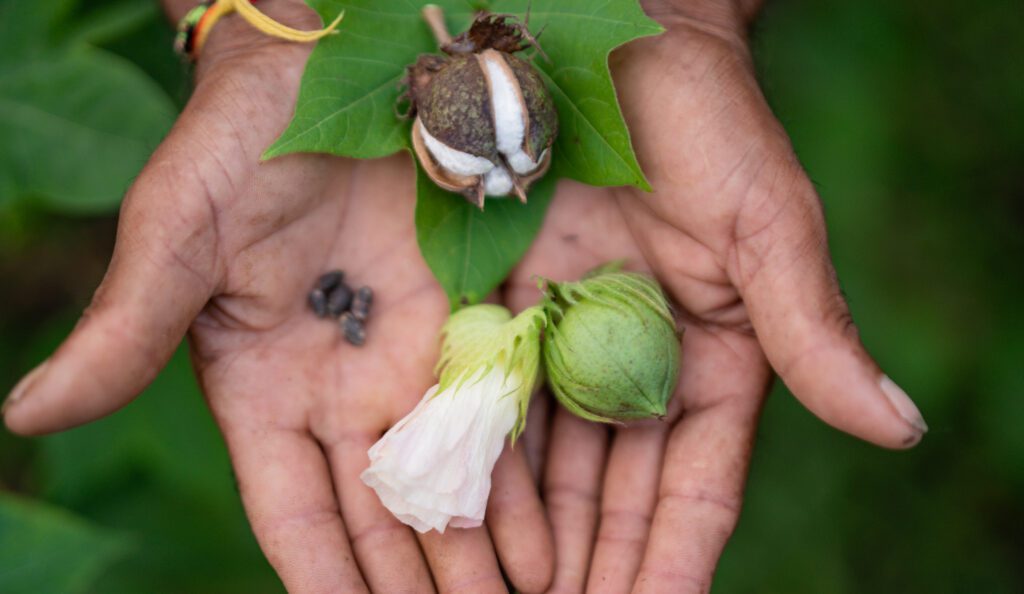
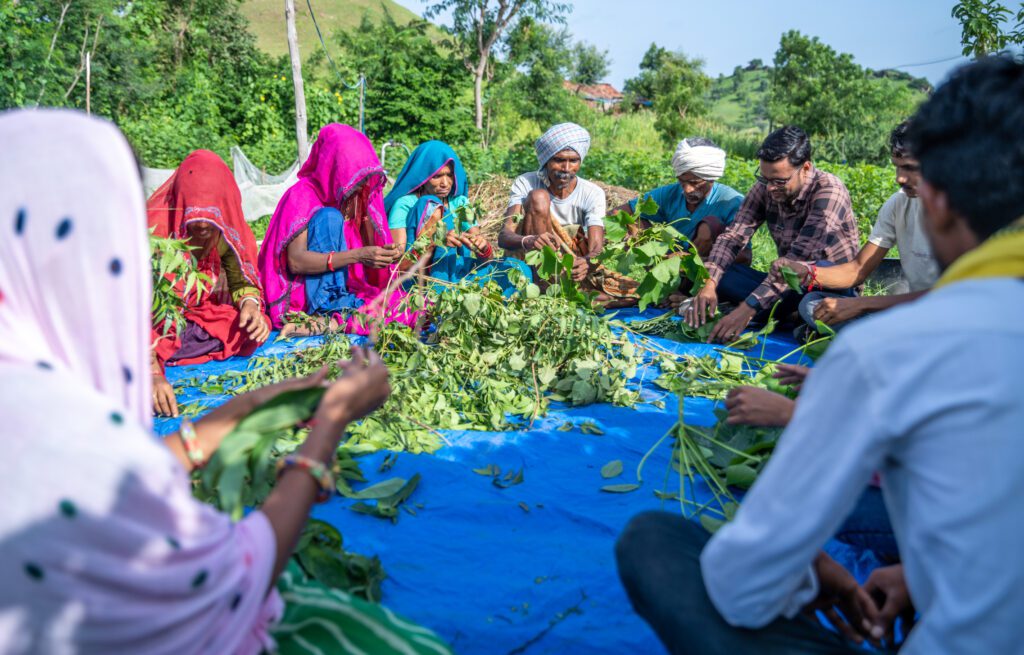
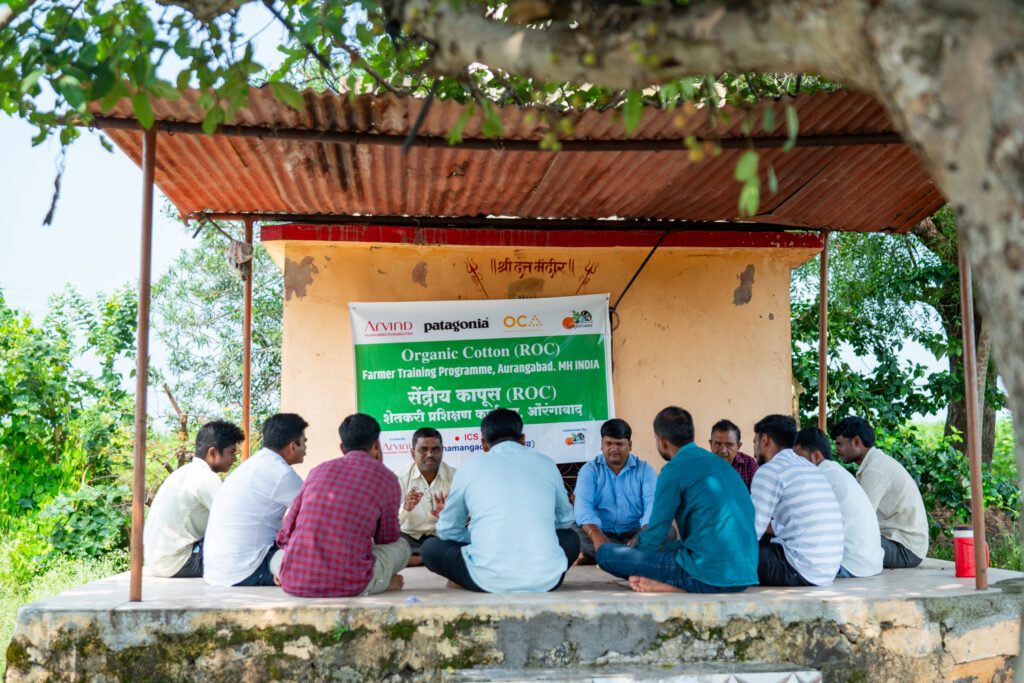
Why does it matter?
Impact on the environment
Farmers play an essential role in ensuring the well-being of our soil and biodiversity during the conversion process. By using non-genetically modified seeds and avoiding harmful synthetic chemicals, they safeguard the health of beneficial insects and birds, and support the natural environment. By relying on ecological processes tailored to local conditions, organic farming systems can sustain and improve the health of soils, ecosystems, and people.
More transparency in the supply chain
As the demand for sustainable products continues to rise, more and more brands are supporting farmers on their path toward organic farming. This not only fosters a more transparent supply chain but also empowers consumers to make informed decisions about the eco-friendly products they purchase.
Benefits for farmers and the land
Cotton farmers who commit to the organic in-conversion process are also taking steps to improve their soil health. These practices are not only beneficial for the environment but also for the farmers’ health, due to the absence of pesticides and chemicals. Moreover, farmers who embark on this journey are gaining new skills, such as generating bio-inputs using locally available natural resources and reducing their reliance on external sources. Along with training, farmers often receive financial incentives, such as pre-paid non-genetically modified seeds. Cotton is a crucial “cash” crop for farmers, as it helps them sustain their households. Many farmers rely on the income they generate from cotton. Once certified organic, farmers can sell cotton to international brands and retailers through market linkage access platforms.
Another beneficial practice is the crop diversification, which reduces over-reliance on one commodity like cotton and improves the overall health and nutrition uptake of the farmer and their family. Organic in-conversion farmers also tend to experience reduced cost of production due to the adoption of bio inputs instead of expensive agrochemicals used under conventional farming systems.
The journey, challenges, and solutions
The conversion period from conventional to organic agriculture typically takes up to three years, which is necessary to rebuild soil fertility and restore the balance of the ecosystem. During that time, farmers make the shift towards employing the organic practices necessary to achieve certification. These include using locally procured manure; implementing crop rotation; incorporating biochar to reduce soil density and hardening, increasing soil porosity, retaining nutrients; and practising minimum tillage during land preparation to preserve the soil nutrients.
During this time, all practices prohibited and required in organic farming apply, and certification bodies conduct annual audits to assess the farmer’s advancement towards obtaining full organic certification. Farmers can experience lower yields and, as their cotton is not yet certified organic, they cannot claim the organic premium payment. In short, farmers initially lose money. Towards the end of the season, farmers need to connect with a buyer and find a suitable market for the produced raw materials, which can be challenging.
Brands’ procurement decisions are crucial in creating the market linkage until the organic certification is completed.
The initial financial loss, cumulated with the other risks and challenges, often creates resistance from traditional farming communities. Smallholder farmers rely heavily on cotton production for their livelihoods. Financial incentives and support are essential for farmers during this difficult phase. Organisations can play a vital role in bridging the gap through investment, funding, and market linkages. Market linkage support and access to incentives for organic in-conversion cotton help make a business case for these farmers who can otherwise incur losses in the in-conversion phase due to reduced yield.
Support and growth
OCA has always focused on creating the conditions for organic cotton to thrive – by putting farmers first. We have launched several projects to support cotton farmers navigate the challenges of the in-conversion period.
Cooperation for accelerating the transition
In 2022 OCA and the Partnership for Sustainable Textiles (PST), a multi-stakeholder initiative that unites companies, associations, NGOs and standard organisations to work towards a sustainable textile industry, launched a partnership initiative to drive improvements across the organic cotton industry. The Partnership Initiative Organic Cotton in India was launched to build a fair, environmentally friendly, and economically viable organic cotton supply chain. With the support of 10 brands and two standard organisations, the initiative quickly bore fruit: over 11,000 farmers are being supported on their journey towards organic cultivation. It has empowered farmers by providing access to dependable, non-genetically modified seeds. These farmers have also received comprehensive training in organic cultivation methods, ensuring the successful adoption of sustainable practices. Beyond training, many brands have committed to long-term procurement agreements, aimed at, increasing farmers’ profits through premiums.
The project is largely financed by the participating companies and additionally supported by the Ministry for Economic Cooperation and Development of the Federal Republic of Germany.
The time to act is now
As more brands choose to source organic cotton, demand is swiftly outpacing supply because there aren’t enough incentives for farmers to convert or transition to organic production. The clearest course of action is investing in organic in-conversion cotton to increase the supply and meet the sector’s public commitments.
Brands that join such initiatives are the frontrunners, leading the trend of recognising the importance of investing in supporting farmers today and reaping the benefits of increased organic cotton supply.
Today, Kerli stands as a shining example of the potential of in-conversion cotton. Her fields are now a testament to the positive impact of organic farming. Her success demonstrates the benefits not only for farmers and the land but also for the environment.
Her story reminds us that the path to sustainability is not always easy, but it’s undoubtedly worth it. As more and more brands recognise the importance of investing in farmers like Kerli, the future of organic cotton farming will be a promising one, as long as we continue supporting farmers through sector-based partnerships and initiatives at all levels of the value chain.
